
Contains cover sheet and teacher example/artifact.
- Subject:
- Composition and Rhetoric
- Elementary Education
- Language, Grammar and Vocabulary
- Speaking and Listening
- Material Type:
- Lesson Plan
- Author:
- Johanna Richards
- Date Added:
- 05/22/2019

Contains cover sheet and teacher example/artifact.
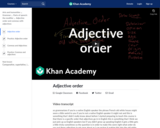
Learn about the adjective order of Standard American English and your new favorite memory aid: DOSA-SCOMP.

This seminar will introduce three of eight types of figurative language (alliteration, onomatopoeia, and idiom). Through mainly fictional texts( tongue twisters, comics, songs, etc.), you will identify these types of figurative language, determine their meanings, and formulate project-based activities to prove your understanding of these common figurative language types.StandardsCC.1.2.5.F Determine the meaning of words and phrase as they are used in grade-level text, including interpretation of figurative language.
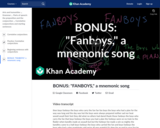
"FANBOYS" is a mnemonic device you can use to help remember the coordinating conjunctions of English. Team Grammar made this video, figuring that we couldn't very well cover conjunctions without writing a song, now could we? If you're moved to make your own version, send it our way at remix@khanacademy.org; we're excited to hear what you do!

Why does "goose" become "geese" and "foot" become "feet"? David the Grammarian and Jake the Linguist explain.

You may have been hearing a lot about the "singular they" recently. But what is it? How does it work, what is its history, and is it grammatical? Let's find out.
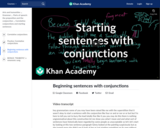
Is it okay to begin a sentence with a conjunction like "but" or "because"? Yes. David explains why.
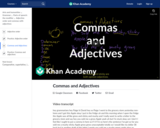
Commas separate adjectives when those adjectives belong to the same category: determiner, opinion, size, age, shape, color, origin and material. So two adjectives that are both opinions (a mushy, sticky apple) should have a comma between them, but two adjectives that are an opinion and color (a mushy green apple) should not.
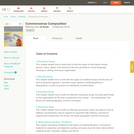
This online textbook provides a generalized understanding of composition and to serve as a supplementary aid to high school English teachers.
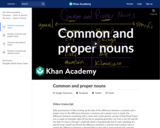
What's the difference between a common noun and a proper noun?

Reinforce student understanding of parts of speech through the analysis of sample cinquain poems followed by the creation of original cinquains.
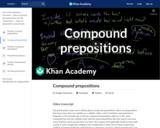
These prepositions are called compound prepositions, or multisyllabic prepositions. Like most prepositions, they have both literal and figurative meanings. David explains.

A concrete noun refers to a physical object in the real world, such as a dog, a ball, or an ice cream cone. An abstract noun refers to an idea or concept that does not exist in the real world and cannot be touched, like freedom, sadness, or permission.
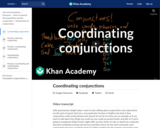
Coordinating conjunctions connect parts of sentences to each other. David explains how.
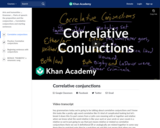
Correlative conjunctions work in pairs to connect parts of sentences. David teaches you how they do it!

A' and 'an' are the indefinite articles of English; 'the' is the definite article. David explains what that means!

Students will learn how descriptive words make stories clearer and more interesting to read.

This primer provides a basic introduction to Egyptian colloquial Arabic, beginning with the alphabet, demonstrating both pronunciation and the writing system. From there the text moves on to discussing the parts of speech as well as some of the dialect's basic grammar. The book then progresses to common phrases and ends with a vocabulary section that relies on transliteration.
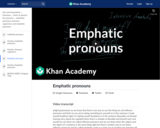
Sometimes we use reflexive pronouns like "myself" and "ourselves" for emphasis in a sentence, like, "If you won't help me, then I'll do it myself!" KA's Grammar Fellow, David, explains this usage.

A Scavenger Hunt to identify parts of speech, parts of a sentence, and sentence mechanics.